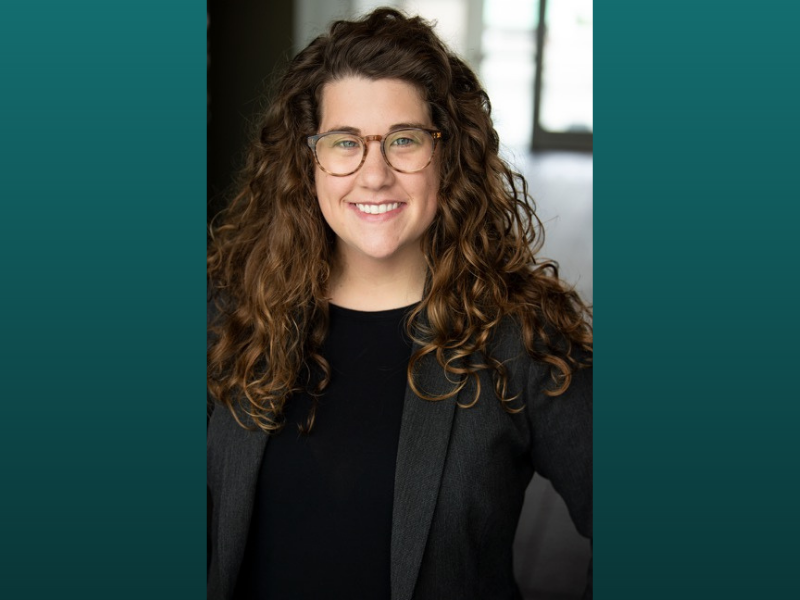Tulane Law student is 1st WWCDA Ruth Bader Ginsburg award recipient
Raised in rural Alabama, in part by her grandmother, third-year Tulane Law student Sara Wood experienced first-hand how low-income communities are denied access to justice solely because of their poverty.
She became the first college graduate in her family through sheer grit and hard work and is now poised to become its first lawyer.
Her determination and her extensive work helping those whose voices are not heard has earned her the inaugural Ruth Bader Ginsburg Outstanding Law Student Award from the Women’s White Collar Defense Association.
“Third-year law student Sara Wood has to be one of the most genuine, resilient, humble and deeply committed public interest students I have had in my 22 years of teaching,” wrote Tulane Law Prof. Janet Hoeffel in nominating Wood. “The first in her family to graduate college, Sara has driven herself both to overcome and to embrace the unimaginable barriers that have made her into the passionate social justice law student and lawyer she is today.”
Named in honor of the late U.S. Supreme Court Justice, the WWCDA Justice Ruth Bader Ginsburg Outstanding Law Student Award will be presented annually to a woman in her final year of law school who “best exemplifies Justice Ginsburg’s commitment to excellence, resilience, extraordinary work ethic and tireless efforts to ensure justice for all in the eyes of the law,” the WWCDA explained.
WWCDA President, Karen Popp, added, “Following the tragic passing of Justice Ruth Bader Ginsburg, the second woman appointed to the U.S. Supreme Court and a lifelong champion for gender equality, there was a call from our members to honor her legacy in a way that enabled aspiring young women to pursue a career in law with the support of the WWCDA community, which is now 2,500 members strong across 45 global chapters. We were incredibly pleased to bestow this year’s inaugural award on such an accomplished, strong, and driven nominee, such as Sara Wood. Our organization looks forward to recognizing other up-and-coming women leaders, who are the future of the white-collar field, through this honor at our Annual Awards Gala.”
Watch this year's WWCDA's 2021 Gala.
The WWCDA’s mission is to promote diversity in the legal profession, aid in networking and business opportunities for women and provide educational programming focused on the defense of government enforcement actions and internal investigations, compliance, and ethics issues. Among other benefits of the Award, Wood will receive mentorship and networking opportunities from WWCDA members.
Wood’s experiences mirror the spirit of the award. With her loved one’s encouragement and scholarships to help, Wood graduated with two bachelor’s degrees, a BA and a BSW, with honors, from Auburn University. During her undergrad, she taught HIV/AIDS prevention to people ensnared in the criminal justice system and interned with a federal public defender’s office assisting with capital cases.
After graduation, Wood took a job as an investigator at the Southern Poverty Law Center where she advocated to end debtors’ prisons and to stop predatory lending practices, helping expose the economic injustices imposed on criminal defendants.
As she was deciding about law school, she came to Tulane Law and met with several criminal law professors, including Hoeffel.
“That first meeting, she told me she wanted to become a lawyer so she could help build a statewide public defender program in Alabama, having seen first-hand the abysmal representation of criminal defendants in her home state,” Hoeffel said. “I was impressed with her dedication, drive and maturity, and I knew then I wanted her at Tulane.”
In law school, Wood said she has struggled to reconcile how the law is written compared to how it’s lived, even as she found it a powerful tool to rectify injustice.
“Through my personal and professional experiences, I have seen first-hand how the criminal legal system disproportionately swallows low-income people and people of color,” Wood said. “At the same time, I have witnessed how powerful legal advocacy can be, not only to rectify so many of the wrongs in our world but also creating an environment where everyone has the opportunity to thrive regardless of their socioeconomic status.”
In New Orleans, Wood wasted no time. Her first year of law school, she worked as a law clerk at the Tulane University’s Legal Assistance Program (TULAP), which helps faculty, staff and students navigate legal issues. By her second year, she was accepted into the Immigrant Rights Clinic, one of the few which accepts second-year students. She volunteered with the Promise of Justice Initiative’s Unanimous Jury Project, which successfully helped overturn Louisiana’s law allowing non-unanimous jury verdicts.
This year, Wood has a highly-sought-after spot in the Criminal Justice Clinic helping represent clients in pre-and post-conviction efforts. She recently put together a proposal with the Promise of Justice Initiative to create a fellowship to eradicate and reduce unjust sentences for those serving in Louisiana prisons.
Wood was surprised that Hoeffel had chosen to nominate her, especially for an award in honor of Justice Ginsburg, whom she said, “embodied excellence in advocating for women and marginalized people and brought warmth to everyone she interacted with, especially those with different backgrounds than her own.”
After reflecting on this, she was reminded of her grandmother, who died in 2021 during the COVID-19 pandemic.
“Much like Justice Ginsburg, my grandmother taught me how to bring warmth and light to everyone I interact with, especially those who come from different backgrounds than me,” Wood said. “She taught me that every experience is a lesson, every person has the ability to teach me something and the value of finding joy even in the worst situations.”
Wood is the perfect inaugural recipient of the award, Hoeffel said. She received it in a virtual ceremony in December.
“To me, Sara’s load has been overwhelming, but she has handled it with calm, dedication and grace,” Hoeffel said. “Like Justice Ginsburg, she will spend her life and every ounce of her being dedicated to bettering the lives of marginalized communities.”

